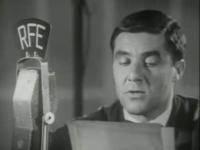BROOKE GLADSTONE: Global communications can be used to pull the world together and minimize our differences. It can also be used to intensify them.
MALE CORRESPONDENT: This is Radio Free Europe.
[MUSIC UP AND UNDER]
BROOKE GLADSTONE: Radio Free Europe was launched in 1951 to undermine the Communist regimes in Soviet Bloc Eastern Europe. It was covertly funded and run by the U.S. government but was staffed with exiled anti-Communist journalists from Eastern Europe. In the early years it was seen purely as a propaganda machine, but as the Cold War drew on, it also became known as a source of good journalism. James F. Brown, a British citizen who ran RFE in the late '70s and early '80s, had much to do with that change. He died last month at the age of 81. Brown joined the network as a research analyst shortly after the failure of the Hungarian Revolution in 1956. At the time, RFE was taking heat for inciting the Hungarian uprising, which was bloodily quashed by the Soviets. Arch Puddington, author of Broadcasting Freedom: The Cold War Triumph of Radio Free Europe and Radio Liberty, says Radio Free Europe was faulted for a couple of reasons. For one thing:
ARCH PUDDINGTON: It was encouraging acts of violence in a combustible environment. And, number two, it was critical of people who were actually trying to bring about a peaceful revolution.
BROOKE GLADSTONE: So when Brown finally took over Radio Free Europe, Poland’s solidarity movement was on the rise, which ultimately helped to expel Soviet Communism from Poland, and it was a big part of the domino effect across Eastern Europe. Now, Brown was credited with playing an important behind-the-scenes role in the rise of solidarity.
ARCH PUDDINGTON: Well, Radio Free Europe, and Jim Brown, because he was the chief of Radio Free Europe at the time, played an important role in letting Poles know what was going on throughout their country. That was always an important point about Radio Free Europe because the Communist strategy was keep local events local, don't let people know in Gdansk what was happening in Warsaw. So it let people know nationally what was happening all over the country, and it encouraged people to support solidarity but to recognize the geopolitical realities of 1980. And those realities were the Soviets had intervened in Hungary in 1956, in Czechoslovakia in 1968, in East Germany in 1953, so it could be assumed that they would intervene in Poland, if there was an overt effort to detach Poland from the Soviet empire.
BROOKE GLADSTONE: So the key here is that it wasn't a call to action, but it was a repository of information about what people were doing across Poland.
ARCH PUDDINGTON: The purpose of Radio Free Europe, from the very beginning until the end of the Cold War, was to encourage change. In the early years it did it in a polemical way that incited at some points. In the later years it did it in much more nuanced ways. And Jim Brown felt that detente-like strategies would facilitate that process, and other people, such as the Reagan administration, felt that more muscular approaches would do the job better.
BROOKE GLADSTONE: Brown quit Radio Free Europe because of the Reagan administration’s insistence that the network air zealous anti-Communist programming. I guess they didn't disagree so much on the ends as they did about tactics. Did he speak to you about why he quit?
ARCH PUDDINGTON: He did. He was dissatisfied with the Reagan approach. He especially disagreed with some of the personnel choices that were being made. He really tried to choose people who were moderately inclined and good journalists, and he felt that the Reagan administration was leaning towards ideology and politics first. He objected, his objections were noted; nothing was done, and he quit.
BROOKE GLADSTONE: So the crucial thing for Brown was that he was committed to journalism over propaganda.
ARCH PUDDINGTON: He was a scholar. He published a number of books. And in his view, change in Eastern Europe was going to be a gradual evolution, and anyone who suggested it was going to come about all at once through violent revolution was irresponsible.
BROOKE GLADSTONE: Thank you very much.
ARCH PUDDINGTON: It was a pleasure.
BROOKE GLADSTONE: James F. Brown, former director of Radio Free Europe, died last month at the age of 81. Arch Puddington is author of Broadcasting Freedom: The Cold War Triumph of Radio Free Europe and Radio Liberty. He’s also director of research at Freedom House. Radio Free Europe, along with its sister network, Radio Liberty, still broadcasts in 20 countries, largely in Asia, Russia and the Middle East.

